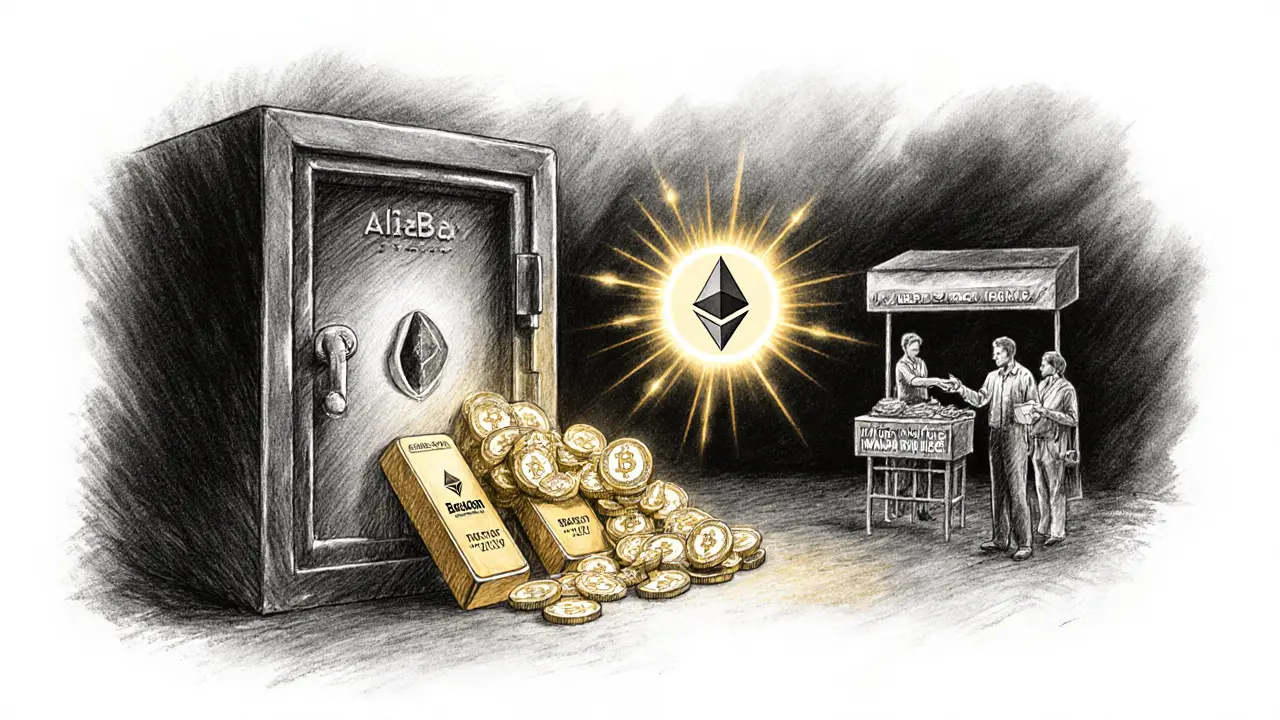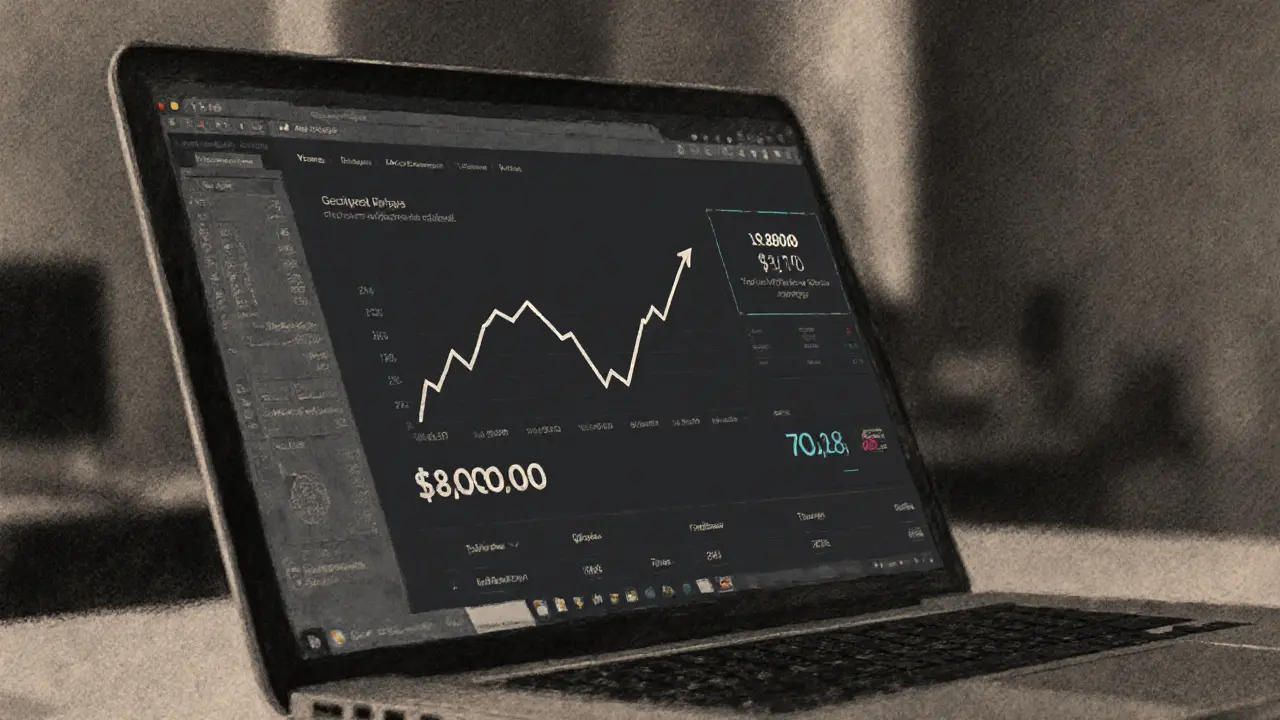BABAon Token Price Tracker
Current Token Metrics
Token Price
Net Asset Value
Total Supply
24h Volume
Price Movement Simulation
Simulate how price changes affect your investment
$0.00
Key Features
- ERC-20 Standard Ethereum
- Dividend Reinvestment Automatic
- Regulatory Framework BVI + SEC Reg S
- Liquidity Source DEXs
- Minimum Investment Fractional
Market Sentiment
Quick Overview
- BABAon is an ERC‑20 token that mirrors Alibaba Group’s stock performance.
- It automatically reinvests dividends, giving holders a total‑return exposure.
- Trades on Ethereum‑based DEXs; you need a crypto wallet and some ETH for gas.
- Regulated under a British Virgin Islands (BVI) structure with a SEC RegS exemption.
- Price moves with both Alibaba’s equity market and broader crypto sentiment.
What Is Alibaba Tokenized Stock (BABAon)?
When you see BABAon is a cryptocurrency token that provides economic exposure identical to holding Alibaba Group Holding Limited (BABA) shares, while automatically reinvesting any dividends earned. It was launched by Ondo Finance a DeFi platform that specializes in tokenizing real‑world assets. The token lives on the Ethereum blockchain, follows the ERC‑20 standard, and carries the contract address 0x417…fa09ef for on‑chain verification.
How Tokenization Bridges Stock and DeFi
The tokenization process works like this:
- Ondo Finance purchases Alibaba shares on a regulated market.
- Those shares are locked in a custodial account under BVI jurisdiction.
- For every share (or fraction) locked, an equivalent number of BABAon tokens are minted.
- Investors buy BABAon on decentralized exchanges, gaining fractional ownership without a brokerage account.
Because the token is an ERC‑20 standard token on Ethereum that supports smart‑contract functionality and easy integration with wallets., you can hold it in MetaMask, Trust Wallet, or any Ethereum‑compatible app. Transactions settle in seconds, and gas fees are paid in ETH.
Economic Exposure and Dividend Reinvestment
Alibaba pays quarterly dividends in cash. Instead of sending cash to each token holder, Ondo’s smart contract automatically converts those dividends into additional BABAon tokens and distributes them proportionally. This means the Alibaba tokenized stock not only tracks price movements but also captures total‑return performance. Key figures (as of October2025):
- Current price: $182.26 per BABAon.
- Net Asset Value (NAV): $179 per token.
- Total supply: 10,781.11 tokens (all circulating).
- 24‑hour volume: $255,139, up 2.17%.
Comparison With Traditional Alibaba Shares and Other Tokenized Stocks
| Feature | BABAon (Ondo) | Alibaba ADR (NASDAQ: BABA) | Other Tokenized Stock (e.g., Tesla Token) |
|---|---|---|---|
| Blockchain Platform | Ethereum (ERC‑20) | Traditional equity market | Varies (Ethereum, Solana) |
| Dividend Handling | Auto‑reinvested as extra tokens | Cash dividend to brokerage | Usually cash payout to token address |
| Regulatory Jurisdiction | BVI with SEC RegS exemption | U.S. SEC registered | Mixed (often BVI or Cayman) |
| Liquidity Source | DEXs (Uniswap, SushiSwap) | Stock exchanges | DEXs + centralized crypto exchanges |
| Minimum Investment | Fractional (as low as 0.001BABAon) | One whole share (~$180) | Fractional depending on token design |

How to Acquire BABAon
Getting BABAon isn’t like buying a stock through Robinhood; you need a crypto wallet and a way to interact with a DEX. Here’s a step‑by‑step guide:
- Install a non‑custodial wallet (MetaMask, Trust Wallet, or Coinbase Wallet).
- Buy or transfer enough ETH to cover gas fees (≈$5‑$15 per transaction).
- Connect your wallet to a DEX such as Uniswap a popular Ethereum‑based decentralized exchange..
- Paste the BABAon contract address
0x417…fa09efinto the token search field. - Swap ETH for BABAon, confirming the transaction and paying the gas fee.
- Optionally, add BABAon to your wallet’s “custom token” list to see the balance.
Binance’s help center provides a visual walkthrough for linking wallets to DEXs, which is useful for newcomers.
Risks and Regulatory Landscape
Tokenized securities sit in a gray area between traditional finance and crypto. Key risks include:
- Regulatory shift: While BABAon currently operates under a SEC RegS exemption which allows offshore offerings to non‑U.S. investors without full registration., any change in U.S. or BVI policy could affect token availability.
- Smart‑contract bugs: A flaw in the dividend‑reinvestment code could jeopardize token balances.
- Liquidity crunch: With only 53 unique addresses holding BABAon, a large sell‑off could depress prices sharply.
- Dual market exposure: You’re vulnerable to both Alibaba’s stock volatility and broader crypto market sentiment.
Because the token is under British Virgin Islands law the legal framework is offshore, offering flexibility but less investor protection than SEC‑registered securities., always do due diligence.
Market Dynamics and Sentiment
Data from Coinbase the major crypto exchange that also tracks market sentiment. shows a strong “greed” sentiment for BABAon, which often leads to short‑term price spikes. Conversely, during equity market downturns, the token can behave like a crypto safe haven, as noted by Kriptomat a crypto exchange that monitors cross‑asset moves.. This duality makes price predictions tricky. Holder statistics reveal a concentrated but growing community: 53 unique addresses, 34 active over the last month, and a 960% increase in holder count. Monthly transfer volume topped $1.9million across 931 transactions, indicating active arbitrage and staking strategies. Some users stake BABAon in liquidity pools to earn additional fees, adding another layer of yield.
Future Outlook for Tokenized Securities
The tokenization trend is gaining momentum. Platforms like RWA.xyz a tracker for real‑world asset tokens. list BABAon alongside dozens of other equity‑backed tokens. If regulators clarify tokenized security rules, we could see broader institutional participation, tighter custody solutions, and possibly integration with traditional broker‑deals. For BABAon specifically, three factors will drive its trajectory:
- Alibaba’s corporate performance: Revenue growth, regulatory news in China, and earnings surprises directly affect token price.
- Crypto market health: Ethereum gas costs, overall market sentiment, and DEX liquidity pools influence buying pressure.
- Regulatory clarity: A definitive stance from the SEC or BVI on tokenized securities could either unlock new capital or impose restrictions.
Investors who understand both equity analysis and DeFi mechanics stand to benefit most.
Frequently Asked Questions
What does BABAon represent?
Each BABAon token mirrors a fractional share of Alibaba Group. Holding the token gives you the same price exposure and automatically reinvested dividends as a direct shareholder.
How is BABAon different from buying Alibaba stock?
BABAon trades 24/7 on crypto DEXs, requires a crypto wallet, and offers fractional ownership without a brokerage. Traditional stock buying involves market hours, broker fees, and a higher minimum investment.
Can I earn dividends from BABAon?
Yes, dividends are captured by Ondo’s custodial account and automatically minted as additional BABAon tokens, so you see a growing token balance instead of cash payouts.
Is BABAon regulated?
It operates under a British Virgin Islands legal framework with a U.S. SEC RegS exemption, meaning it’s compliant for non‑U.S. investors but not registered like a traditional security.
What wallet should I use?
Any Ethereum‑compatible non‑custodial wallet works-MetaMask, Trust Wallet, or Coinbase Wallet are the most common choices.
How do I sell BABAon?
Connect your wallet to a DEX, swap BABAon back to ETH or a stablecoin, and withdraw the proceeds to an exchange or your bank via a crypto‑fiat gateway.
What are the main risks?
Regulatory changes, smart‑contract bugs, limited liquidity, and exposure to both equity and crypto market swings are the biggest concerns.


BABAon is just another overhyped crypto gimmick that pretends to be a real stock.
The concept of tokenizing Alibaba shares is clever, especially for folks who want fractional exposure without a brokerage.
It also sidesteps market hours, which can be handy for night‑owls.
I'm curious how the custodial process handles the underlying shares – does Ondo hold them in a trust or a custodian bank? 🤔
Knowing that could clear up a lot of the regulatory fuzz.
Honestly, if you already have a crypto wallet, swapping ETH for BABAon is as easy as grabbing a meme coin.
Stop whining about the SEC; if you don't like the token, just sell it on Uniswap and move on.
In strict regulatory terms, the BVI structure does not equate to a full SEC registration, thereby introducing material compliance risk that investors must duly acknowledge.
One might reflect that the fusion of equity and blockchain represents a modern alchemy, turning traditional assets into digital ether, yet the substance remains subject to the same market whims.
Great summary! 👍
Don't be fooled – the token's price will follow Alibaba's downturn just as fast.
The tokenization paradigm employed by Ondo leverages smart contract automation to instantiate a synthetic derivative instrument.
By minting ERC‑20 representations of underlying equity, the protocol achieves parity in price exposure through oracle‑driven price feeds.
However, the reliance on off‑chain custodial arrangements introduces a counterparty risk vector that is not mitigated by on‑chain consensus mechanisms.
Moreover, the dividend reinvestment mechanism operates via a periodic tranche minting process, which necessitates gas expenditure proportional to token holdings.
Liquidity provisioning on decentralized exchanges is contingent upon sufficient market depth, which, given the modest holder base, may precipitate slippage during high‑volume exit events.
The regulatory overlay, encapsulated by the BVI jurisdiction and SEC Reg S exemption, provides a veneer of compliance but does not obviate the requirement for ongoing reporting to custodial entities.
Investors must also factor in the intrinsic volatility of the Ethereum network, where base fee fluctuations can materially affect transaction cost efficiency.
From an asset allocation perspective, integrating BABAon into a diversified portfolio necessitates correlation analysis with both equity indices and crypto market benchmarks.
Empirical data suggests a non‑linear relationship between underlying share performance and token price during periods of market stress.
The token's Net Asset Value (NAV) provides a reference point, yet market price can diverge significantly due to speculative demand.
Risk management protocols should therefore incorporate stop‑loss thresholds calibrated to both token price and underlying share price movements.
Institutional adoption remains constrained by the nascent legal framework governing tokenized securities across multiple jurisdictions.
Nonetheless, the technological infrastructure offers a scalable solution for fractional ownership of high‑value equities.
Future enhancements, such as on‑chain custodial escrow and cross‑chain interoperability, could ameliorate many of the extant frictions.
In sum, while BABAon exemplifies innovative financial engineering, prudent participants must conduct comprehensive due diligence across regulatory, technical, and market dimensions.
Remember, the beauty of this experiment lies in its ability to democratize access to global giants like Alibaba, yet the underlying mechanics demand discipline.
Stay vigilant, stay curious, and let the token work for you, not the other way around. 🚀
Wow, this is the financial equivalent of a blockbuster movie – high stakes, dazzling tech, and a twist that could change the game! 🎬💥
The drama of merging equity with DeFi is palpable, and every trade feels like a scene from a thriller.
Let's cut the crap – if you think tokenizing stocks is the future, then get on board now or be left in the dust!
Picture this: you could own a slice of Alibaba while sipping a latte, all thanks to a tiny ERC‑20 token dancing on Ethereum – it’s like fintech poetry in motion! 🌟
Most people hype these tokens, but I see the danger – the dual market exposure can crush you faster than a bad meme.
The strategic considerations for incorporating BABAon into an institutional portfolio extend beyond mere price tracking; they encompass governance, custodial risk, and alignment with regulatory mandates.
Consequently, a rigorous compliance framework is indispensable.
Everyone's acting like it’s the next big thing, but honestly, I think it’s just another fad that will fizzle.
i think its a cool idea but watch out for gas fees they can eat ur profit.
From a practical standpoint, the token offers flexibility, yet the necessity of managing ETH for gas adds an extra layer of operational overhead that users should plan for.
Indeed, the advent of tokenized assets, such as BABAon, signifies a paradigm shift, offering unprecedented accessibility, however, it simultaneously introduces complexities, notably regulatory ambiguity, liquidity constraints, and technical dependencies, all of which warrant careful scrutiny.